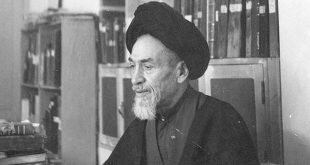Top Shia scholar attending the ceremony for 25th foundation anniversary of the prominent Islamic unity center in Iran said to summon all Muslims to join a common Islamic denomination is neither logical nor legal.
Ayatollah Ahmad Moballeghi, dean of the University of Islamic Denominations, attended the ceremony held for the 25th foundation anniversary of the World Forum for Proximity of Islamic Schools of Thought, explaining his view on religious unity saying that,” the first interpretation of religious unity is to call the nation to join a common denomination.” Rejecting that since the notion is neither logical nor legal.
He said,” Shia and Sunni have their beliefs and if invitation to one common denomination is accepted then each of these schools of thought will be right to invite the other group to embrace his denomination and that will be the basis for deep disagreements.”
The cleric then related on the second interpretation of the notion saying,”The second religious unity will be to create a new version of denomination.” and added,” This means that the previous denominations leave their beliefs to form a unified denomination while this is neither legal, logical nor possible.”
Ayatollah Moballeghi then noted another criticism on the idea to call all for a joint denomination and said,” Another way for a common denomination for all Muslims is to agree the commonalities and wiping out the disagreements and this is also impossible because when a person embraces one denomination, then he has to stay committed to that.”
The cleric then noted that the best form of unity is a co existential unity meaning that Shia and Sunni follow commonalities as an Islamic nation.
He then related on the factors which can boost unity and said,” In a bid to strengthen the coexistence, followers of the different denominations have to be in close and active ties based on four principles including, understanding, negligence (of the differences), cooperation and sympathy.”
Dean of the University of Islamic Denominations stressed that negligence is not approved on religious prejudices and said,” Islam leaves no space for religious bigotry since bigotry is a historical product for the rejected possessions of the groups which has turned into layers of religions penetrating into groups in line with confronting them against each other.”
“Once you follow a certain religion you have to have affection to that but this loyalty should not prevent your respect for other religions. Said the religious figure drawing the line between affection to one’s religion and prejudice (to the point of excommunication, rejection, intolerance or confrontation).
He concluded that as far as prejudice looms in the minds of Shia and Sunni communities, there will be no move in line with formation of a unified Islamic nation.
 Ijtihad Network Being Wise and Faithful Muslim in the Contemporary World
Ijtihad Network Being Wise and Faithful Muslim in the Contemporary World
